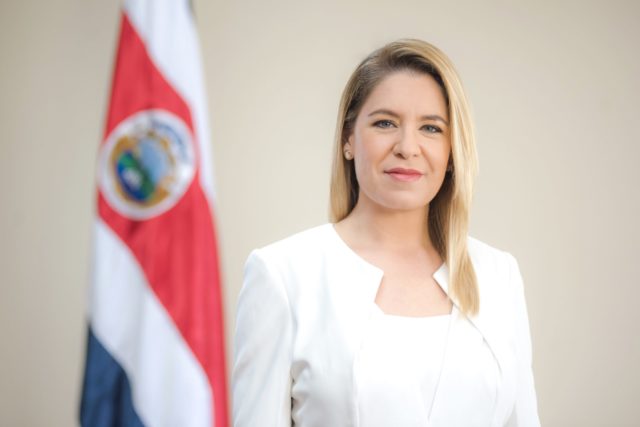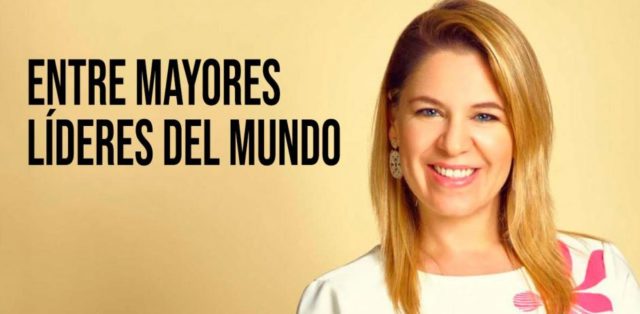
The recognition goes to Claudia Dobles, wife of the President of Costa Rica, Carlos Alvarado. In May, Fortune magazine placed her at number 15 on her list of the 50 most important leaders on the planet.
The publication highlights her ambitious plan to “decarbonize” Costa Rica by 2050 and revolutionize its transportation by betting on a carbon-free electric model. All this, in a country that is already considered a world reference for many of its environmental policies and ecological milestones.
The 38 year old architect and urban planner, Dobles has been making a name for herself since her husband won the elections a little over a year ago and demonstrated that she had not the slightest intention of emulating the symbolic role that characterizes many first ladies in the region.

This earned her not a few criticisms and even the suspicion of those who believe that, behind her leadership of such great projects, the idea of succeeding her husband in the presidency when his term ends in 2022 is actually hidden.
About appearing on Fortune list, she states finding out only after the publication appeared, not knowing anything before. It was a pleasure, a surprise that she takes with great responsibility, also taking it as recognition of the country, an effort to make transformations that Costa Rica must face in this Fourth Industrial Revolution.
Dobles explains what the Decarbonization project 2050 is about.
The National Decarbonization Plan that was launched in February is a comprehensive action plan that understands that decarbonization is linked to the economy and that it is a complex process.
It focuses on two major areas. The first is the entire transportation issue. And the other is the agri-food sector, in the sense of how to provide financing to generate technology that can lower carbon emissions from that sector.
Currently the country has a “red note” for its carbon footprint, but in a very favorable context for a positive transformation. The electrical matrix is almost 100% clean,this gives an advantage that many other countries do not have.
“One can make a whole change from the vehicle fleet from fossil fuels to electric power, but if the matrix is not clean, we really are not done closing the loop. We are focusing on improving the public transportation system, regardless of whether it is powered by fossil fuels or electricity. If we had an integrated public transport system, it would lower our carbon footprint”; says Claudia Dobles, who is leading the decarbonization process in the country.

In the short term, the objectives are to develop an electric train system in the metropolitan area that would link four of the seven provinces. It is an opportunity to generate a kind of backbone for a new system, with a modernization of the entire bus system that is integrated into this electric train. To this is going to be added a network of bicycle paths that can connect with train stations, the bus system and pedestrian networks.
Is Costa Rica really “Pura Vida”
How is the process of shifting vehicles toward the use of clean energy? An electric vehicle incentive law exempts them from paying some taxes. In the private sector it is through certain incentives.
As for public transportation, in Costa Rica it is granted by concession and has no subsidy. “So we have to accompany the private sector so that it can change the vehicle fleet. If we do not incorporate financial tools that allow them to make the transition, they can end that cost by transferring it to the rate that people pay and we end up in a vicious circle. With them we are looking for soft loans, green loans, which have much more favorable conditions, with longer terms, so that there is no impact on the rate”, says the First Lady. All this falls under that brand of “green Costa Rica” that the country has. It is always striking that such a small territorial country appears in the first places of environmental rankings.
It is a pride and also a responsibilityto consolidate the national image. If Costa Rica, which is a country with great challenges in its economy, can generate a clear path of action, other countries can to. This is a call for other countries to join.
Dobles reflects about assuming her role of First Lady in a different manner.
“I think that in general terms, the offices of the first ladies do not have a legal framework that regulates what their functions are.I see it as a great advantage. There is no obligation to take on certain tasks, and therefore each First Lady can shape her role according to her abilities and interests”.

“I am an architect, in my life I worked on urban planning projects, where the issue of public transport is always one of the main components if one wants to do more adequate planning and give people answers.I have always had that streak and the President has allowed me to collaborate with his team on these issues.”
How does she view accountabilityat the end of her tenure?
“Accountability has two components. One that is legal, where the First Lady’s office has no responsibility. What we do is work with the rectors to coordinate the projects in a faster way. But there is accountability at the political level. We feel responsible for those projects to come out. In the case of the first lady it is not a legal commitment, but it is a moral commitment. And that one weighs the same, or more.”
About the critics who say that they voted for President Alvarado and not for her to take the lead in key projects for the country, she answers stating being very clear about what to do putting herself at the service of the President and the citizens, collaborating and helping.
Although not being elected by popular election, she feels in a privileged position from where to have an important platform to move and streamline projects and improving them. Emphasizing that the office of First Lady has an important convening capacity and should be a coordination space with lots of potential, and that is what she is trying to do.
Regarding transportation in the region she thinks that many Latin American countries are making important progress in improving the public transport system, some in transition towards a clean energy vehicle fleet, such as Chile, which should be applauded.
In the region there is an understanding that if the cities want to be competitive, they must strive towards development and generate opportunities for all the population, which includes improving the public transport systems. Electric cars are one of the best of the Costa Rican government to decarbonize the country, an example to be followed by other countries.

Since money is required to improve urban infrastructure and mobility. But is that precisely, one of the main problems in Costa Rica is a large fiscal deficit. How will the government finance all the projects if the government has to cut on expenses?
The First Lady answers, “our bet is a public-private alliance, where for very large projects or megaprojects, the State contributes a smaller percentage and the private sector a greater percentage of the total investment, in the context that we have, we think that this is the model that suits us best because we have a liquidity problem and that solves it. And to be attractive to that private investment, we are generating robust and robust feasibility studies.”
About the delicate problem that the nation faces with thousands of Nicaraguans who arrived in Costa Rica fleeing the sociopolitical crisis that is taking place in their country, Dobles affirms, “our country respects the peace and human rights, it is in our history and in our DNA, Costa Rica advocates the resolution of conflicts in a peaceful way, for Nicaragua or any other country that is going through a social crisis.”
“In the case of Nicaragua, what happens to it has a direct impact on Costa Rica, that is undeniable, we are neighbors, we are societies that have very close ties. We are two countries closely linked socially and economically. We are trying to receive in our country people who are seeking refuge.”
“Of course, there comes a point where the institutionality and our own legality does not allow us to give all the answers to that incoming population, so we hope that they resolve their situation in a peaceful way as soon as possible, especially for the people, not just the ones that are coming into Costa Rica, but also the one that is in Nicaragua.”
Finally, thequestion that is on many Costa Ricans mind is, if she has the intention of running as a candidate for the country`s presidential election in 2022?
She firmly answers: No. Stating that, making positive changes can be accomplished from wherever position you are most suited to be in. “The things we are working for are going to transcend this government because they are long-term processes, transformations that do not correspond to one administration, nor two or three, we will continue participating, both Carlos and me, and contributing from wherever we are going to be. But no, I am not going to run for president.”

